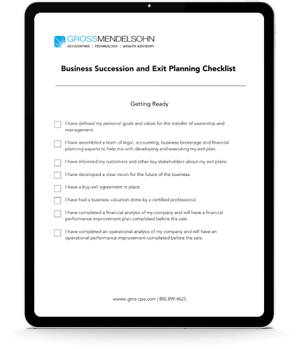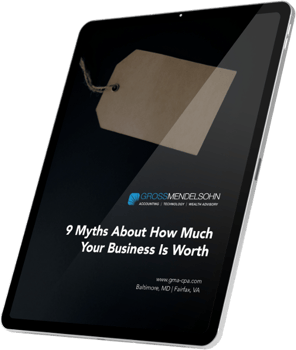Exit planning is a must for family-owned businesses, which often have layers of complexity and emotion thanks to unique family dynamics.
How To Transfer A Family-Owned Business To The Next Generation
Set Up The Next Generation For Success
The Basics Of Exit Planning
What Is An Exit Plan?
Exit planning is the process a business owner goes through to prepare for their eventual retirement and transfer the business to the next generation. Exit planning is especially important for a family-owned business as it can help you make decisions on who you’d like to be involved in the future of your company.
For example, if you plan to transfer your business to your daughter, Sarah, in the next ten years, you can use the process of exit planning to facilitate a gradual and successful transfer of ownership. This might start with hiring Sarah in an entry-level role in your company. As she works her way up the totem pole, she will learn different components of the business and her responsibility will increase over time. In ten years, she’ll have the training, knowledge and capability to lead the business.
Why Is It Important To Have A Team Of Advisors Involved In Your Exit Plan?
You need to include your CPA and attorney in even the earliest stages of the exit planning process. Together you can set important initial goals for the transfer of ownership, like how much of the ownership you want to transfer and who will take ownership of the business. It’s also important to consider the impact of the transfer of a business on your personal finances. Estate planning should play a big part in your exit plan early on in the process.
Who Internally At A Business Should Be Involved In The Exit Planning Process?
Deciding who will have a seat at the table is a vital step in exit planning. It’s important to talk with family members and key employees to determine who wants to be involved. You may discover that some employees have no interest in taking a role in the management side of the business, and that’s okay. Having candid conversations like these early on will save you headaches down the road.
When Is The Right Time To Start Exit Planning?
It’s never too early to start exit planning. By starting the process early, you’ll be able to give yourself enough time to facilitate a smooth transfer of ownership. Think about all of the responsibilities and connections you hold as an owner. You likely have put decades of work into your business, and it’ll take time for the next owner to feel comfortable filling your shoes. By starting exit planning early, you maximize the amount of time you have to make sure that your business is set up for success in the years after your retirement.
What Happens Without An Exit Plan?
A lot can go wrong without a well-thought-out exit plan in place. In our blog post, we tell the story of how the lack of an exit plan destroyed a successful family owned business once the owner reached retirement.
Exit Planning Checklist

Navigating Family Dynamics
What’s The Most Important Factor In Picking A Successor For A Family-Owned Business?
The most important factor, whether you pick an individual successor or team of successors, is that whomever you choose shares your passion and vision. For example, if you want your business to stay an independent company after you retire, you need to choose a successor who shares that desire. Your successor needs to be a leader that can inspire those working in the business. They need to have a vision of what the future of the business can become.
On the other hand, your successor shouldn’t be a family member who doesn’t have the right training or experience to run your business successfully. This is why exit planning is so important for transferring a business to the next generation. Through planning, you have years to develop a successor who has the skills needed to keep the business running smoothly.
If you ultimately decide there isn’t a good successor within your family, consider selling your business to key employees. Remember, the ultimate goal is the long-term survival of your business, which will ultimately provide value to your family for generations to come.
What’s The Difference Between Family-Owned Businesses That Survive To The Next Generation And Those That Fail?
In general, most family-owned businesses fail after the first generation. The speed at which they fail though is often contingent on whether the owner makes practical business decisions, including how early they begin the exit planning process.
In particular, one issue that often expedites the failure of a business is forcing adult children into the business when they are unable or uninterested in filling the role. This can cause morale issues within the company and lead to internal disillusionment, ultimately hurting the long-term viability of the business.
How Can Family Dynamics Complicate The Transfer Or Sale Of A Business?
Family dynamics can make or break the ease of a transfer or sale of a business. In instances when family members don’t get along or are overly competitive, business owners may have to mediate or, in certain circumstances, ask certain parties to leave the business.
Unlike when you’re selling a business to an outside party, family dynamics raise tough questions in terms of estate planning. In cases where there is more than one family member involved in the business, family dynamics can complicate how and how much of the business transfers to particular members.
For example, let’s say one of your three children is involved in the day-to-day operations of the business and plans to lead the business when you retire. How you decide to split (or not split) the business between all three children, especially in terms of estate planning, can be tricky.
On one hand, you could sell or give the business to the child who is actively involved in the company, since they are the one helping grow the value of the business. In this case, your other two children would only receive their fair share of the remaining assets of your estate. On the flipside, to avoid ruffling any feathers, some owners might choose to divide everything among all three children equally, including the business.
Either way, family dynamics can cause even the most business savvy owners to make poor decisions, especially when it comes to the value of their estate. For that reason, it’s important to have an outside advisor you can rely on to bounce ideas off of and ensure you’re making the right decisions for the right reasons.
14 Lessons For Selling A Business

Getting A Business Valuation
What Is A Business Valuation?
A business valuation is the act or process of determining the value of a business or ownership interest. The valuation quantifies future cash flow of the business and assesses the risk and certainty of the future of that cash flow for a future owner.
Why Do Businesses Need A Business Valuation Even When Transferring A Business To The Next Generation?
The valuation becomes important as you explore planning alternatives such as discounted gift strategies. These types of strategies require a valuation to determine the amounts to transfer. To ensure the benefits of a discounted gift, the valuation must accompany the tax return sent to the IRS. With that said, you want to hire a valuator who has taken the time and effort to review your financial situation and can defend any discounts in the event of an audit. If you’re considering selling vs. gifting a business to the next generation, the valuation will set the sales price for the business.
Who Is Involved In A Business Valuation?
You will work hand in hand with a business valuation expert during the business valuation process. You can expect your management and accounting teams to work most closely with the valuator during the process, but you may also need to bring in your business’s professional advisors, such as your attorney, banker or CPA firm.
You’ll want to hire a credentialed valuation expert who possesses one or more of the following certifications:
-
Certified Valuation Analysts (CVA) | National Association of Certified Valuators and Analysts
-
Accredited in Business Valuation (ABV) | American Institute of CPAs
-
Accredited Senior Appraiser (ASA) | American Society of Appraisers
-
Certified Business Appraiser (CBA) | Institute of Business Appraisers
How Much Does A Business Valuation Cost?
The cost of a business valuation varies depending on the size of the business, the complexity of the ownership, the structure of the transaction and the strength of the underlying accounting records.
How Long Does A Business Valuation Take?
A typical business valuation can take anywhere from four to six weeks to complete (or more depending on complexity).
9 Myths About How Much Your Business Is Worth

Tax Considerations
What Taxes Can a Business Owner Expect to Pay When Transferring a Family-Owned Business to the Next Generation?
Whether or not your business is required to pay transfer taxes is dependent on your estate and the value of the assets you own. As of 2023, the current exemption amount is $12.92 million. If your estate falls below that threshold, you likely won’t have to pay taxes on your business when transferring your estate to the next generation. It is important to note that this exemption amount will likely change, especially as different administrations transition through the White House.
If you are getting close to the $12.92 million exemption amount and think you’ll see appreciation in your assets, there is a possibility you will need to pay anywhere between 18-40% in taxes on the transfer of your business.
How Can a Business Owner Limit the Amount of Taxes They Pay When Transferring a Family-Owned Business?
Tax planning is vital in minimizing the taxes you’ll pay in the transfer of your business, and the earlier you start the better. The best tax strategies begin with knowing what you have and what you want to end up with at the end of the day. Depending on the strategies you put in place, you can limit your tax exposure by using tools like:
-
Gifting the business early, before assets appreciate to even higher values
-
Using a grantor retained annuity trust
-
Selling some of your interests in the business to the next generation, paying the taxes at the capital gains rate so the next generation gets a better basis on those assets
Why Does Exit Planning Affect How Much A Business Owner Will Pay In Taxes?
How you structure your exit from a business, whether that’s through gifting to the next generation or through your will, will affect your estate. If you transfer your business during your lifetime and structure the transfer so that you continue receiving some payments or cash flow even after you’re “retired” you will pay a capital gains tax rate, which will be significantly less than what your estate will be required to pay if the business is transferred as part of a will.
4 Critical Tax Consequences To Consider When Selling Your Business

You May Also Be Interested In
Understanding the non-financial factors of the transfer will help stack the odds for success in your favor.
